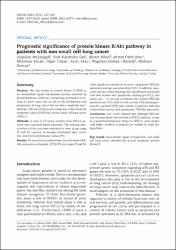| dc.contributor.author | Mayadağlı, Alpaslan | |
| dc.contributor.author | Karabulut Gül, Şule | |
| dc.contributor.author | Bilici, Ahmet | |
| dc.contributor.author | Oruç, Ahmet Fatih | |
| dc.contributor.author | Koçak, Mihriban | |
| dc.contributor.author | Özkan, Alper | |
| dc.contributor.author | Aksu, Atınç | |
| dc.contributor.author | Özdemir Barışık, Nagehan | |
| dc.contributor.author | Gümüş, Mahmut | |
| dc.date.accessioned | 10.07.201910:49:13 | |
| dc.date.accessioned | 2019-07-10T19:57:30Z | |
| dc.date.available | 10.07.201910:49:13 | |
| dc.date.available | 2019-07-10T19:57:30Z | |
| dc.date.issued | 2014 | en_US |
| dc.identifier.citation | Mayadağlı, A., Karabulut Gül, Ş., Bilici, A., Oruç, A. F., Koçak, M., Özkan, A. ... Gümüş, M. (2014). Prognostic significance of protein kinase B/Akt pathway in patients with non-small cell lung cancer. Journal of the Balkan Union of Oncology, 19(1), 157-163. | en_US |
| dc.identifier.issn | 1107-0625 | |
| dc.identifier.uri | https://hdl.handle.net/20.500.12511/2990 | |
| dc.description | WOS: 000334153000023 | en_US |
| dc.description | PubMed ID: 24659658 | en_US |
| dc.description.abstract | Purpose: Akt, also known as protein kinase B (PKB), is an intracellular signal transduction protein activated by growth hormones. PKB/Akt is frequently activated in a variety of cancer types, but its role in the development and progression of lung cancer has not been completely elucidated yet. The aim of the present study was to determine the prognostic value of PKB/Akt in non-small cell lung cancer (NSCLC). Methods: A total of 32 tumor samples from NSCLL patients were examined before treatment. The staining characteristics of the cases were evaluated in terms of age, stage (T and N), response to therapy, histological type, tumor size, and ECOG performance status (PS). Results: No statistical correlation was found between PKB/Akt expression and gender, ECOG PS and stage (T and N), while significant correlation between cytoplasmic PKB/akt expression and age was detected (p < 0.05). In addition, squamous cell carcinoma histology was significantly associated with both nuclear and cytoplasmic staining (p=0.033), and tumor size (< 5 cm) was correlated with nuclear PKB/Akt expression (p =0.03). Both overall survival (OS) and progression-free survival (PFS) were similar in patients with and without both nuclear and cytoplasmic PKB/Akt expression. Conclusion: Our results showed that although PKB/Akt was not associated with survival in NSCLC patients, it may be a potential therapeutic target for NSCLC; more studies with higher numbers of patients are needed to verify this hypothesis. | en_US |
| dc.language.iso | eng | en_US |
| dc.publisher | Zerbinis Medical Publications | en_US |
| dc.rights | info:eu-repo/semantics/openAccess | en_US |
| dc.subject | Intracellular Signal Transduction | en_US |
| dc.subject | Non-Small Cell Lung Cancer | en_US |
| dc.subject | Phospho-Akt (p-Akt) | en_US |
| dc.subject | Prognosis | en_US |
| dc.subject | Protein Kinase B | en_US |
| dc.title | Prognostic significance of protein kinase B/Akt pathway in patients with non-small cell lung cancer | en_US |
| dc.type | article | en_US |
| dc.relation.ispartof | Journal of the Balkan Union of Oncology | en_US |
| dc.department | İstanbul Medipol Üniversitesi, Tıp Fakültesi, Dahili Tıp Bilimleri Bölümü, İç Hastalıkları Ana Bilim Dalı | en_US |
| dc.identifier.volume | 19 | en_US |
| dc.identifier.issue | 1 | en_US |
| dc.identifier.startpage | 157 | en_US |
| dc.identifier.endpage | 163 | en_US |
| dc.relation.publicationcategory | Makale - Uluslararası Hakemli Dergi - Kurum Öğretim Elemanı | en_US |
| dc.identifier.wosquality | Q4 | en_US |
| dc.identifier.scopusquality | Q3 | en_US |


















